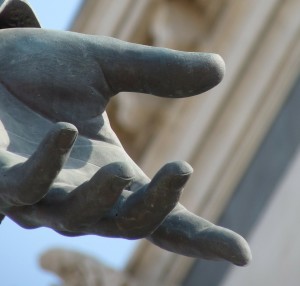In an often viewed TED talk, artist Phil Hansen talks about “embracing the shake.” It is a great message, one truly worth watching or reading. In the face of nerve damage that left his hand shaking too badly to make his preferred art, he learned to embrace this limitation, and it led to more creativity than he could have imagined. His message of embracing limitations should ring especially true for us as followers of Christ, and may be particularly hopeful for those facing mental illness. Read More →
 When you think “blockbuster movie” and “superheroes”, I bet “fear” isn’t the next word in your mind. But if the major motion picture in question is the recent “Avengers: Age of Ultron” then you might have to think again. I do enjoy a good Marvel movie, and I was intrigued at the direct way in which this one portrayed the characters’ struggle with fear as the lynchpin of the proceedings.
When you think “blockbuster movie” and “superheroes”, I bet “fear” isn’t the next word in your mind. But if the major motion picture in question is the recent “Avengers: Age of Ultron” then you might have to think again. I do enjoy a good Marvel movie, and I was intrigued at the direct way in which this one portrayed the characters’ struggle with fear as the lynchpin of the proceedings.
After all, fear is a primal emotion. Ability to feel fear is essential to survival, and fear prepares us for action faster than we can consciously think. At the same time, fear can keep us trapped, immobilized both physiologically and psychologically. All of us have fear, and we are never safe out of its reach. (You may have heard that “Perfect love casts out fear.” Know any perfect lovers?) What can we take from this ultra-popular film that will inform our own, personal struggle with fear? Read More →
 At Easter, we celebrate the ultimate victory of Joy over suffering. Christ is Risen! Alleluia! Death, where is your sting?
At Easter, we celebrate the ultimate victory of Joy over suffering. Christ is Risen! Alleluia! Death, where is your sting?
All this hoopla must look a little silly from the outside. Its hard to understand the thrill of Easter if you have not experienced the agony of Good Friday. And our current culture is not high on Good Friday. Usually, we are trying to find ways to avoid suffering. The implicit message is often that happiness results when all suffering is eliminated or successfully avoided. As Christians, however, we believe that the joy of Easter is possible precisely because of suffering. This is our model: it is by dying that we can rise to new life.
At a time in my own journey when I particularly needed it, I read a book called Hinds Feet On High Places. It is an allegorical story of the spiritual life, and the main character, Much Afraid, attempts to journey to the high mountains where The Shepherd lives. One of the things that stuck with me most is that The Shepherd chose two companions for Much Afraid to help her make it through the journey: Sorrow and Suffering. Read More →
The stereotypes would have us believe that those who see a therapist are broken, crazy, weak, incapable or lesser-than. My experience has been the opposite. Those I work with are quite strong in many ways, not least in their willingness to face the pain and suffering that comes with change. They have more than the usual ability to be vulnerable, and by owning their brokenness, show forth the glory of humanity. (More on that here) They have often given me the gift of seeing the world through their eyes, and it can be a beautiful view. Today I celebrate those shared moments by sharing some of the images or metaphors with which they have described their experience. *
 Suffering and Sadness as Stairs to Freedom Read More →
Suffering and Sadness as Stairs to Freedom Read More →
Deciding to seek help is often the hardest part of actually beginning therapy. In my last post, I addressed the mistaken stigma of seeking the help of a therapist, and doubts Catholics in particular might have about seeking therapy. Overcoming our own doubts, hesitations and preconceptions is hard enough. After that, finding a therapist should be easy – just open the phone book, call someone and go. Unfortunately, it is rarely that simple. One aspect that often makes choosing a therapist more complicated is the intimacy of the work. Going in, you know you are trusting someone to understand you, even the parts of yourself that you don’t usually share with others. That can involve plenty of doubt and uncertainty. Will the therapist really understand me? Really get what is going on with me? Really be able to help me? For these reasons, those seeking help are often evaluating more than just credentials – they want to know if the therapist as a person is a good fit with them.
Because of my background, I am often asked to suggest a therapist or help in the process of finding one. As often as not, the person who asks me is not the person going to therapy, but is someone who wants information to smooth the process for a friend or relative. Regardless of who is asking, what I describe below is how I would approach the process. There is no “right way” to choose a therapist, so my intent is to provide some information to help you ponder rather than laying out a perfect series of steps. Read More →
 By our nature as humans, we need others. Giving and receiving help is as human as breathing. God looked at Adam and said (essentially): “You’re gonna need some help.” So He provided Adam with a helpmate. Across our lifespan, we turn to others for help: to our parents for nurturing, our teachers for education, our doctors for all our physical ills. We turn to spouses and best friends to soothe us during the bruises of life, and we turn to our church community to revive our weary, broken, wayward souls. We do not think twice about seeking help from these people, but there is one person from whom many people still hesitate to seek help: a therapist (a.k.a psychologist, psychotherapist, or counselor). Read More →
By our nature as humans, we need others. Giving and receiving help is as human as breathing. God looked at Adam and said (essentially): “You’re gonna need some help.” So He provided Adam with a helpmate. Across our lifespan, we turn to others for help: to our parents for nurturing, our teachers for education, our doctors for all our physical ills. We turn to spouses and best friends to soothe us during the bruises of life, and we turn to our church community to revive our weary, broken, wayward souls. We do not think twice about seeking help from these people, but there is one person from whom many people still hesitate to seek help: a therapist (a.k.a psychologist, psychotherapist, or counselor). Read More →

